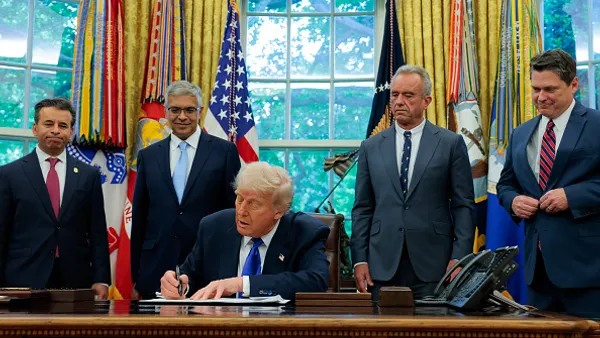Dive Brief:
- Industry associations representing the nation's manufacturing, trucking and retail sectors expressed optimism, interest and willingness to work with the upcoming administration in recent public statements.
- The American Trucking Associations stated it looks forward to working with President-elect Trump on sustainable infrastructure funding, tax reform and fair and free trade, while the National Association of Manufacturers expressed its wish to restore faith in the country's vital economic and government institutions.
- Meanwhile, the National Retail Federation (NRF) said it hopes pragmatism will prevail over ideology, and highlighted 10 key issues for retailers to watch as Trump pulls together his administration. The association also expressed hope that, post-election, consumers would rush to stores.
Dive Insight:
Business reactions were overwhelmingly positive yesterday as news settled that Donald Trump would be the 45th President of the United States. Although the markets opened with a severe drop and global currencies suffered, stocks quickly recovered as the country recovered from a poll-induced shock. Most industries, now, are hopeful a Trump administration will draft legislation to address long-standing issues like infrastructure investments, perceived over-regulation and tax reform.
The one thorn, for many, is Trump-the-candidate's anti-trade promises which has by and large killed hope for the immediate passage of the Trans-Pacific Partnership and spurred new fears over the future of the North American Free Trade Agreement (NAFTA).
"NRF strongly opposes new tariffs and supports TPP and other free trade agreements because retailers rely heavily on imported merchandise," the association said in its press release.
The shipping industry is among the most concerned over the likelihood of anti-trade policies in the U.S. Already, the industry is facing record-low global trade volumes, which has led to bankruptcies and unsustainable freight rates, and they fear protectionism would only further harm the industry.
Business advocacy over with these issues will be key to ensuring risk is addressed before it becomes policy, and associations like the ones mentioned are at the forefront of federal engagement.











